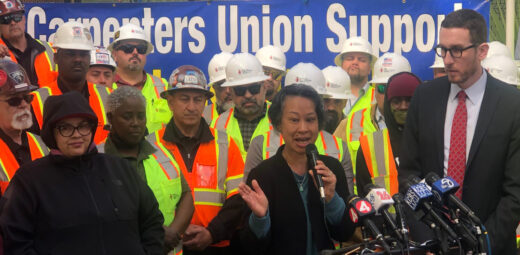
May 04Clearing Hurdles to Affordable Homes: Rallying Around SB-423
Since it went into effect in 2018, California state bill SB-35 has been an effective tool to bring Californians the affordable homes we so desperately need more efficiently, by speeding up the approvals process for proposed developments that meet a certain set of conditions. Mercy Housing California (MHC) has made good use of this policy tool – in fact, the law has helped MHC shorten the time between submitting paperwork and breaking ground for more than 1,000 affordable homes
SB-35 is scheduled to expire in 2025, but a new bill called SB-423 proposes to extend it.
In February, California State Senator Scott Wiener announced the introduction of SB-423 at a press conference held at Tahanan, one of MHC’s supportive communities in San Francisco. Tahanan is a shining example of a thriving, healthy community that was completed more quickly with the aid of SB-35. In fact, an independent report found that along with other strategies, the streamlined entitlements process helped Tahanan be built in 30% less time than comparable developments, going from an idea to a welcoming residence in less than three years. MHC’s Director of Real Estate Development for the Bay Area, Ramie Dare, spoke at the event and shared more about the importance of SB-423.
“Right now, there are almost 450 San Franciscans, many of them very low-income seniors, living in an affordable home in a Mercy Housing community that was streamlined through SB-35,” shared Ramie. “When the bill took effect in 2018, we immediately recognized what a game changer it would be for the people we serve. The kinds of developments that used to take ten months, a year, or sometimes up to two years to get approved can now get their entitlements in as little as two months. When you think about how long so many people have waited for a safe, affordable place to call home, every single day makes a difference.”
SB-423 is co-sponsored by the California Conference of Carpenters, whose members attended the announcement event in droves and voiced support for the labor provisions provided in the bill, including paying workers prevailing wages and providing health insurance to workers on most developments. Around half of California construction workers rely on public benefits and many struggle with finding affordable housing for their families.
MHC is not the only housing developer that has used the bill to create new homes more efficiently. Around 18,000 homes, most of which are affordable, have been built with a streamlined approvals process thanks to SB-35. If SB-423 is not passed, developers will no longer be able to use this extremely effective policy tool after it sunsets in 2025.
“California can’t afford to go backward at a time when our state’s families, seniors, and people with disabilities are desperate for affordable homes,” added Ramie. “The thousands of California residents currently thriving in communities that were streamlined by SB-35 are a testament to the importance of SB-423.”
Elaine, a resident of Tahanan who spoke at the announcement event, voiced support for the measure and emphasized the power of affordable housing to make San Francisco a better place.
“Not everybody has great-paying jobs. If you work at the supermarket, you’re making minimum wage, and that doesn’t cover your rent. If you do pay your rent, you have no money for gas, you have no money for anything else,” Elaine said. “There are parking lots everywhere that aren’t being utilized. Just like this parking lot where Tahanan was built. It’s truly a blessing to be here, and for everybody who approved this, I’m really thankful for that.”
No related posts.
Stay Up To Date
Get news on Mercy Housing and inspiring stories of change delivered to your inbox.


